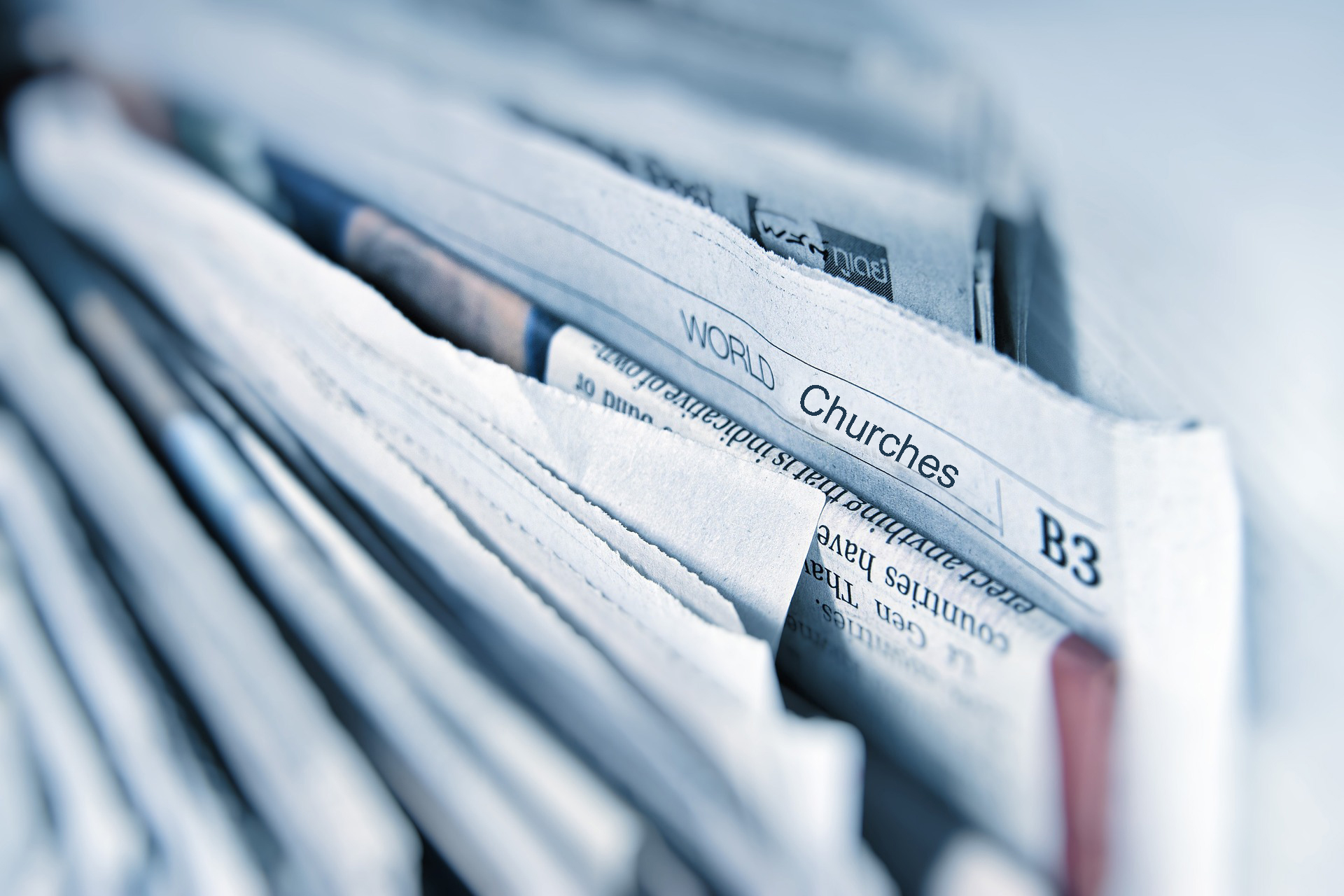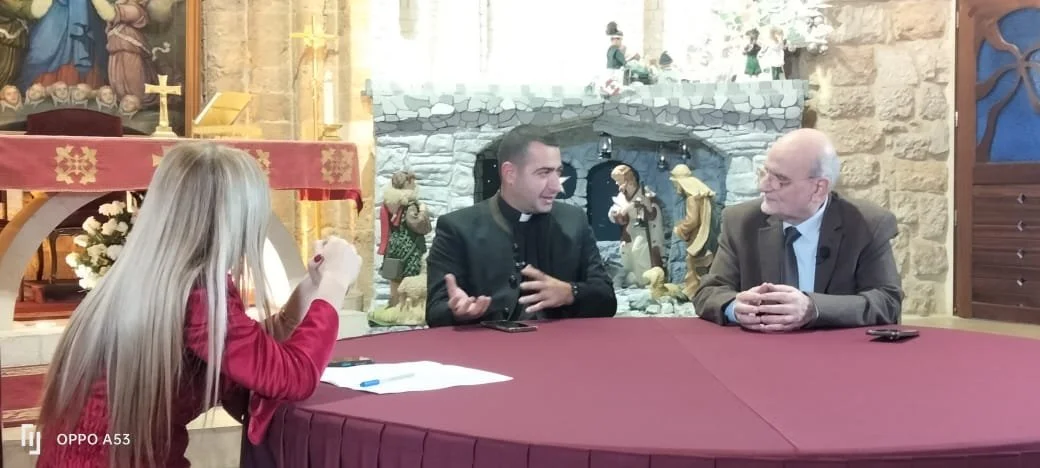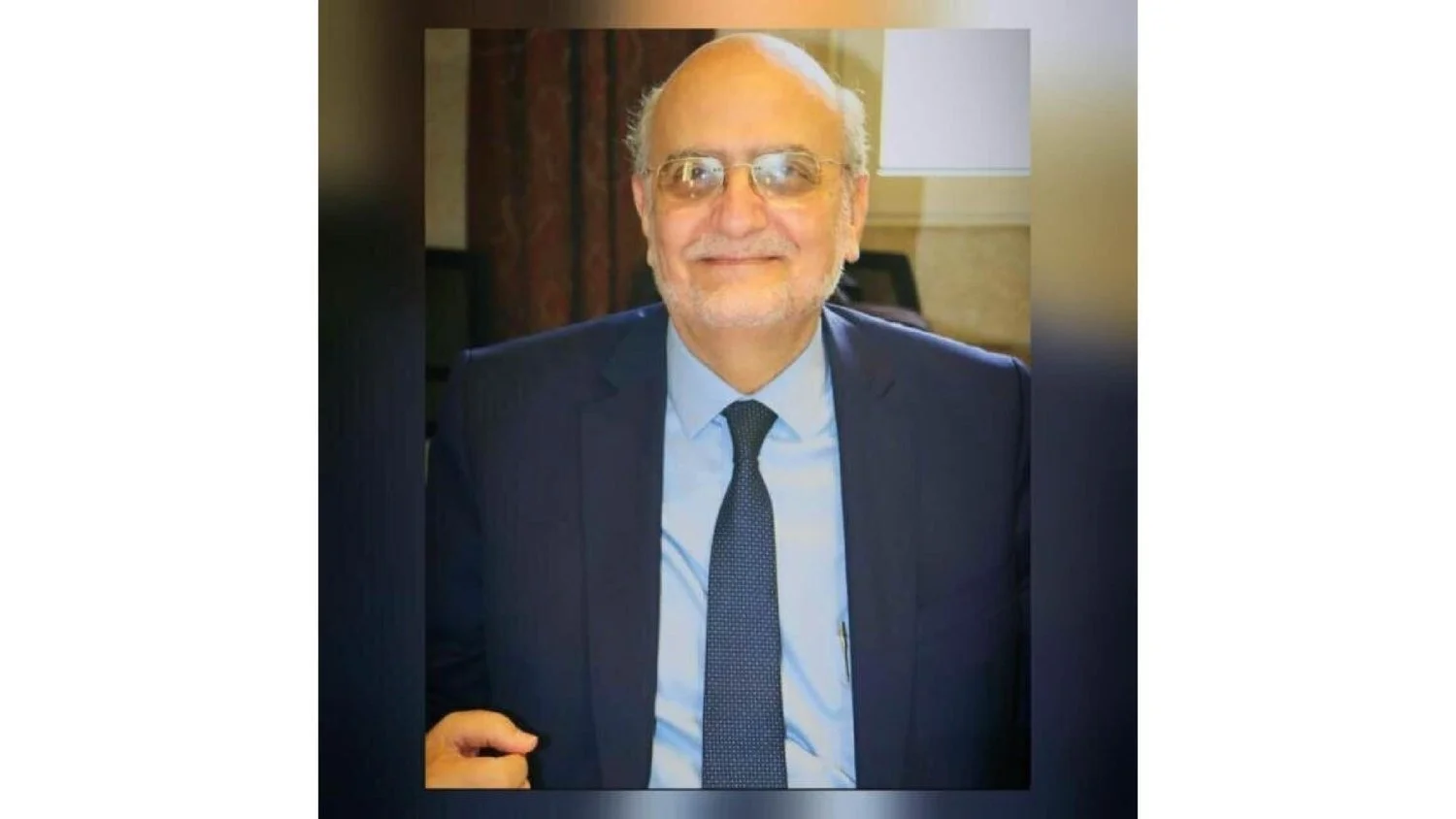
MECC
The MECC Secretary General Professor Michel Abs Participates in a Special Christmas Episode
The Secretary General of the Middle East Council of Churches (MECC) Professor Michel Abs, participated in a Christmas episode with the Parish Priest of Our Lady of Amchit Father Charbel Al Khoury. They were interviewed by the Journalist Lea Maamary. The interview centered around Christmas topics, as well as about human and social, existential issues.
Moreover, Bethlehem - the Church of the Nativity, which was embodied by Father Charbel Al Khoury in his Parish, was highlighted. It carries many messages confirming that the Light of Christ alone illuminates the darkness of the earth.
Massacre a peaceful people… Is that just a matter of opinion?
Professor Dr. Michel Abs
Secretary General of the Middle East Council of Churches (MECC)
Once again, I find myself compelled to address the same issue: the rotating genocide taking place in the Antiochian Levant.
Since the end of the Industrial Revolution, and the subsequent First World War—which led to the industrialized West dividing up the legacy of the “Sick Man”, this ill-fated region has seen the arrival of various missions, the most cunning and dangerous of which was the King-Crane Commission. In parallel, treaties carved up this area, fragmenting it further—most famously Sykes-Picot—so that our peoples have known neither stability nor peace, even though we are the Land of Peace, where the Lord of Peace was incarnated, the Light from Light.
Colonizers sat around conference tables—better described as conspiracy tables—drawing lines lengthwise and crosswise, which later became political borders for a nation shattered into scattered remnants of peoples. As if conspiracy were not enough, they went on to create an artificial entity and tasked it with exterminating the native inhabitants of the land, just as they had done on the continents they had colonized. Thus began wars of extermination and tragedies in a place they call the Cradle of Civilizations.
If we must give this region a modern name, we could call it the “Zone of Roaming Murder.”
The elements of the tragedy became clearer after the Second World War, when Palestine was partitioned, and a racist state was established there. This created hostility between a segment of our peoples who share that state’s religion and the rest of the population with whom they had lived for more than two thousand years…
Video - Word of His Eminence Metropolitan Antonios Al Soury on the Occasion of the Launching of the Platform of the Word
His Eminence Metropolitan Antonios Al Soury, Greek Orthodox Metropolitan of Zahle, Baalbek and their Dependencies, and Member of the Executive Committee of the Middle East Council of Churches (MECC) delivers a word via video on the occasion of the launching of “The Platform of the Word” at the Middle East Council of Churches (MECC) in partnership with Télé Lumière and Noursat TV Channel. He was interviewed by the Journalist Lea Adel Maamary, Director of the Platform, and Coordinator of the Church and Media Relations at the Middle East Council of Churches (MECC).
A Lasting Peace?
Middle East Socio-Economic Overview
Report: November 2024
After a series of intensive diplomatic talks, a ceasefire agreement was reached putting an end to the military conflict in Southern Lebanon. As soon as planes stopped dropping bombs on Lebanese soil, a massive chunk of the displaced started returning back to their homes. Although calm is reestablishing itself within Lebanon, the situation remains to be deplorable in Gaza as violence continues to claim lives. It is as though the occupier’s policies and intentions towards what remains of Palestine are continuing unabated.
Video - The MECC Secretary General Professor Dr. Michel Abs Highlights Via "ME Sat" the MECC Statement
In Light of the Circumstances Taking Place in the North of the Syrian Arab Republic, Especially in the City of Aleppo
The Secretary General of the Middle East Council of Churches (MECC) Professor Dr. Michel Abs was a guest within the “Good Evening” program on the “ME Sat” Egyptian TV Channel to talk about the statement issued by MECC in light of the circumstances taking place in the North of the Syrian Arab Republic, especially in the city of Aleppo.
The MECC Media Urges All Media Outlets to Exercise Accuracy and Caution in Receiving and Publishing News
The churches in the city of Aleppo have confirmed their steadfastness and resilience, continuing to hold prayers and masses as usual and as required.
They also denied the rumors about any demands received from the factions controlling Aleppo, including imposing conditions on dioceses and churches.
This denial of these rumors comes to refute what is being circulated on social media, which causes confusion and instability among civilians.
We urge all media outlets, including social networks, to exercise accuracy and caution in receiving and publishing news, given the sensitivity of the current phase.
Le Département Média du Conseil des Églises du Moyen-Orient (MECC/CEMO) appelle tous les médias à faire preuve de précision et de prudence dans la réception et la diffusion des informations
Les milieux ecclésiastiques de la ville d'Alep ont confirmé leur constance et leur résilience, en continuant à célébrer les prières et les messes comme d'habitude et comme il se doit.
Ils ont également démenti les rumeurs concernant d'éventuelles demandes qui leur auraient été adressées par les factions contrôlant Alep, y compris l'imposition de conditions aux diocèses et aux églises.
Ce démenti de ces rumeurs vient réfuter ce qui est véhiculé par les réseaux sociaux et qui suscite la confusion et l'instabilité parmi les civils.
Nous appelons tous les médias, y compris les réseaux sociaux, à faire preuve de précision et de prudence dans la réception et la diffusion des informations, compte tenu de la sensibilité de la phase actuelle.
Statement Issued by the Middle East Council of Churches
Concerning the Events Occurring in the North of the Syrian Arab Republic
The Middle East Council of Churches (MECC) is observing with deep concern the events unfolding in the north of the Syrian Arab Republic, especially in the Aleppo region, as if the Middle East is destined never to find the path to peace or stability, which hinders its progress and development.
The MECC is concerned about the people—their dignity, their security, their safety, the continuity of their normal lives, the provision of their basic needs, and ensuring that they are not exposed to anything that may negatively affect their lives and the future of their generations.
We ask the Lord to grant the people the strength to have patience and to hold on to their land, their homes, and their institutions, to remain in their communities and try to continue their daily lives as much as possible. We also hope that public and private institutions will be allowed to continue their work with whatever capabilities are available to them, out of kindness for the people who watch local developments with concern…
Communiqué émis par le Conseil des Églises du Moyen-Orient
Concernant les événements en cours dans le nord de la République arabe syrienne
Le Conseil des Églises du Moyen-Orient (MECC/CEMO) observe avec une profonde inquiétude les événements qui se déroulent dans le nord de la République arabe syrienne, en particulier dans la région d'Alep, comme si le Moyen-Orient était condamné à ne jamais trouver le chemin vers la paix ou la stabilité, ce qui entrave son progrès et son développement.
Le MECC est concerné par les personnes, leur dignité, leur sécurité, leur bien-être, la continuité de leur vie normale, la satisfaction de leurs besoins essentiels, et s'assure qu'elles ne soient pas exposées à ce qui pourrait avoir un impact négatif sur leur vie et l'avenir de leurs générations.
Nous demandons au Seigneur de donner aux habitants la force de faire preuve de patience, de s'attacher à leur terre, leurs maisons et leurs institutions, de rester dans leurs communautés et de tenter de poursuivre leur vie quotidienne autant que possible. Nous espérons également qu'il sera permis aux institutions publiques et privées de poursuivre leurs activités avec les moyens dont elles disposent, par considération pour les personnes qui regardent avec inquiétude les transformations locales…
Flashes of Light from the Bottom of Darkness
Lessons from the Lebanon War
Professor Dr. Michel Abs
Secretary General of the Middle East Council of Churches (MECC)
Lebanon experienced, for a considerable period, a bitter ordeal that led to thousands of casualties, the displacement of a quarter of the Lebanese population, the destruction of more than fifty thousand homes, and an unknown number of businesses. Additionally, some southern villages were erased from the national map, albeit temporarily.
In the midst of this crisis, the Lebanese once again proved that they are a people who love life and deserve it. Their solidarity and social and national unity are stronger than all the violent storms that have battered the nation.
The quarter of the Lebanese population who were displaced—overwhelmingly from a particular religious community — found warm hearts embracing them in the areas to which they fled.
The reception the displaced received, and the care and attention bestowed upon them by the host communities, were exemplary and exceeded all expectations. This was evident during the displaced people's stay in their places of refuge, as expressed by the returnees upon their return to their neighborhoods and villages.
Indeed, we can say more than that. This displacement and embrace, and the approximately two-month stay in host areas, fostered friendships through good treatment. This is also what the displaced expressed upon their return, laying the foundation for tomorrow's Lebanon, where its people interact with one another within the crucible of the nation.
During this displacement, the true image of the Lebanese people, their values, and the eternal bond that ties them to one another became clearly evident — a bond that dates back thousands of years and which no force on earth can break.
Tell Me, O Manger
Video – A Christmas Reflection by the Secretary General of the Middle East Council of Churches (MECC) Professor Dr. Michel Abs
The Middle East Council of Churches Issues the Ecumenical Calendar for December 2024
The Middle East Council of Churches (MECC) have now issued its online Ecumenical calendar for the month of December 2024. It includes the Ecclesiastical and Liturgical Feasts of the various Families of Churches in the Middle East. In addition to international days identified by the United Nations, and which are related to the MECC identity and its spiritual and human mission.
CEC Holds Its Governing Board Meeting
The MECC Secretary General Professor Dr. Michel Abs
Calls for Prayer and Solidarity with the Middle East
“Together, we can sustain hope amidst these immense challenges”
At the invitation of the Conference of European Churches (CEC), and in the presence of its President His Eminence Archbishop Nikitas of Thyateira and Great Britain, the Secretary General of the Middle East Council of Churches (MECC) Professor Dr. Michel Abs participated, online, at the CEC’s Governing Board meeting held on Friday, November 22, 2024, in Brussels.
For the occasion, the MECC Secretary General Professor Dr. Abs delivered from Beirut a speech in which he highlighted the grave challenges facing the Middle East, calling on the European Churches to support and Pray for the region, on the intention of peace and justice.
Professor Dr. Abas spoke about the difficult circumstances that the region is passing through, especially as it lives under siege and faces political unrest, instability, and insecurity since decades. He pointed out that "the Middle East is witnessing a rise of discrimination and deep political divisions. Economic conditions are deteriorating, forcing many, especially Christians, to emigrate."
Churches in the Mediterranean: Addressing Desertification Through Responsible Banking
A Webinar Organized by WCC, with the Participation of MECC
December 9, 2024, at 3pm Beirut Time
As environmental crises worsen around the world, the World Council of Churches (WCC) is organizing a webinar entitled “Churches in the Mediterranean: Addressing Desertification Through Responsible Banking,” on Monday, December 9, 2024, at 3pm Beirut Time, which you can participate in it by clicking here.
Participants will be speakers from member Churches in the region, experts from the Middle East Council of Churches (MECC), the Conference of European Churches (CEC), and All Africa Conference of Churches (AACC), as well as Dr. Mercedes Caron, Scientific Researcher at the European Forest Institute.
Accompaniment and Listening Amidst the Difficult Circumstances that Lebanon is Passing Through
MECC Implements Two New Sessions of the “Spiritual and Psychological Support” Program
The Middle East is suffering... a sentence that perfectly describes the situation that the region has been passing through for many years as a result of wars, crises and conflicts. It is a tragic scene in every sense of the word: destruction, displacement, death, and extreme poverty... Hence, the will to live remains the strongest! This is what the Middle East Council of Churches (MECC) has sought to affirm since its establishment, especially that the issue of humanity, of every marginalized and suffering person, lies at the core of its priorities.
Therefore, alongside its social services, MECC continues to implement psychological and spiritual support programs to accompany the people of the region in facing the difficulties surrounding them with great hope and deep faith.
In this context, the MECC Theological and Ecumenical Department organized two new sessions of the "Spiritual and Psychological Support" program between October and November 2024, specifically implemented for Lebanon due to the difficult conditions it is facing on various levels—security, social, economic, and health. These sessions took place at Saint Jacob Monastery in Karm Saddeh.




















